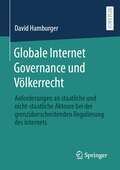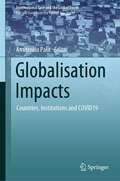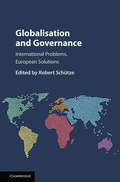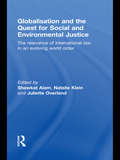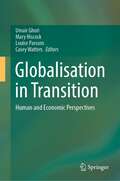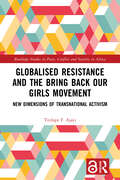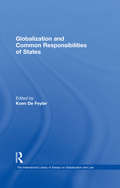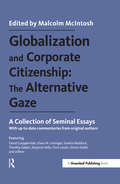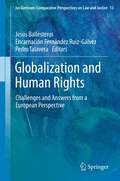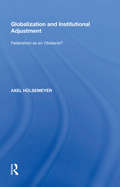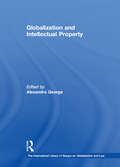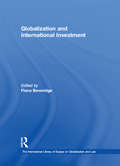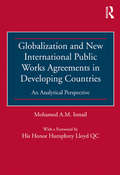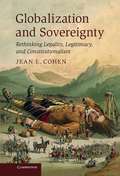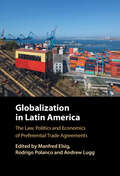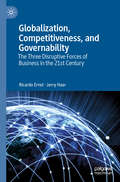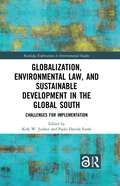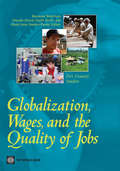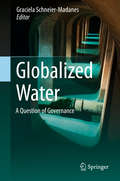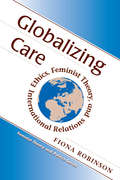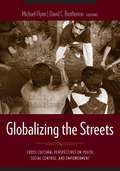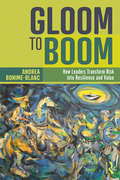- Table View
- List View
Globale Internet Governance und Völkerrecht: Anforderungen an staatliche und nicht-staatliche Akteure bei der grenzüberschreitenden Regulierung des Internets
by David HamburgerDie Regulierung des Internets, häufig auch als Internet Governance bezeichnet, erfolgt gegenwärtig durch eine Vielzahl sowohl privater als auch staatlicher Akteure. Zugleich ist es eine der drängendsten Herausforderungen mit Blick auf die Zukunft des Internets, den ständigen Prozess des Wandels und der Fortentwicklung dieses Mediums regulatorisch zu begleiten und einzuhegen. Dies wirft die Frage auf, welchen Regelungen und Vorschriften Regulierungsmaßnahmen unterliegen, die auf das Internet abzielen. Da aufgrund der entgrenzten Natur des Internets einer Regulierungsmaßnahme praktisch stets eine grenzüberschreitende und damit internationale Dimension zukommt, lässt sich dies jedoch nicht allein anhand nationaler Rechtsvorschriften beantworten. Stattdessen ist hierfür ein Rückgriff auf das Völkerrecht angezeigt. Der Band soll einen Beitrag dazu leisten, die Bedeutung des Völkerrechts für die globale Internet Governance zu ermitteln.
Globalisation Impacts: Countries, Institutions and COVID19 (International Law and the Global South)
by Amitendu PalitThe book reviews globalisation by identifying causes behind the discontent it has produced in recent years. It variously engages in economics, political economy, development and policy discourses to study experiences of countries and institutions in managing and adjusting to globalisation. Extending the analysis to latest global developments, including the remarkable advance of technology and digitalisation, and political and economic upheavals caused by COVID19, the book collects varied academic perspectives and reflects on the present as well as future. Comprising chapters written by distinguished academics and policy experts, the book is a rare collection of cross-disciplinary objective evaluations of globalisation.
Globalisation and Agricultural Landscapes: Change Patterns and Policy Trends in Developed Countries
by Jørgen Primdahl Simon SwaffieldWhilst agricultural landscapes are products of the local ecosystem and community in which they are situated, they are becoming increasingly affected by the same global issues, and are converging under the dynamics of globalisation. Combining landscape ecological research and an examination of relevant public policy, this book investigates the dynamic relationship between agricultural landscapes and the global change processes, such as urbanisation, by which they are being transformed. Landscape change is analysed in the context of biophysical patterns, market dynamics, and specific public policy frameworks, through a series of case studies from different OECD countries spanning Europe, Asia Pacific and North America. Particular emphasis is placed upon the way that landscapes are changing under differing policies of agricultural subsidy including the EU Common Agricultural Policy. This is an ideal resource for graduate students and researchers in landscape ecology and agriculture as well as policy analysts working in the agricultural sector.
Globalisation and Governance: International Problems, European Solutions
by Robert SchützeWhile it might have been viable for states to isolate themselves from international politics in the nineteenth century, the intensity of economic and social globalisation in the twenty-first century has made this impossible. The contemporary world is an international world - a world of collective security systems and collective trade agreements. What does this mean for the sovereign state and 'its' international legal order? Two alternative approaches to the problem of 'governance' in the era of globalisation have developed in the twentieth century: universal internationalism and regional supranationalism. The first approaches collective action problems from the perspective of the 'sovereign equality' of all States. A second approach to transnational 'governance' has tried to re-build majoritarian governmental structures at the regional scale. This collection of essays wishes to analyse - and contrast - the two types of normative and decisional answers that have emerged as responses to the 'international' problems within our globalised world.
Globalisation and the Quest for Social and Environmental Justice: The Relevance of International Law in an Evolving World Order
by Shawkat AlamThere are few topics as controversial as globalisation. It is meant to bring economic growth and solve a range of social, cultural and humanitarian problems. However, there are significant debates in relation to the extent that the reality of globalisation reflects this idealized vision. In particular, globalisation has produced a highly interdependent world, rendering state boundaries meaningless and challenging the ideology and limits of certain areas of international law. This book will provide the opportunity to address some of the multifaceted issues provoked by the issue of globalisation. The book is an exploration of the intricate nexus that emerges as a result of globalisation, inextricably linking together issues of international law, human rights, environmental law and international trade law. Bringing together a number of experts in the field, the book focuses on the areas of social justice and environmental justice, and explores the links that exists between the two and the effect of globalisation on these areas. A variety of topics are addressed throughout the chapters of this book – including biodiversity, the law of the sea, biotechnology, child labour, the rights of women, corporate social responsibility, terrorism and counter-terrorism, water resources, intellectual property rights and the role of non-government organisations. As globalisation has many facets and actors, the contributions to the book engage with interdisciplinary research to deal with the various challenges identified, and critically explore both the potential of globalisation as a vehicle of sustainable and equitable development.
Globalisation in Transition: Human and Economic Perspectives
by Mary Hiscock Umair Ghori Louise Parsons Casey WattersThis book brings together diverse ideas on selected facets of globalisation and transitions in globalisation. The scholars that have contributed to this book examine the phenomenon of globalisation through varied lenses, focusing specifically on the human and economic perspectives. These analyses originate in many areas and different legal systems but are all connected through the work of Professor John Farrar and the associations of the contributors with him. This book does not attempt to provide answers to the many challenges of globalisation. Instead, this book discusses selected, particular aspects of globalisation that derive from and are connected to the authors’ own research. The thematic diversity of this book is a true strength and should draw a broad range of readers. Whilst this book is primarily written from a legal angle, its content overlaps with broader specialised policy areas, with contributions ranging from taxation to ageing, from insolvency to social licences, and from refugees to the treatment of first nations people. In short, there is something for everyone in this book. As a tribute to the life’s work of an outstanding legal scholar, Professor John Farrar, this book explores legal responses to the social and economic impacts of globalisation. After personal acknowledgments from colleagues highlighting the significance of his scholarship, this book is divided into two parts. The first part addresses the social impact of globalisation, focusing on immigration and the impact on First Nations people. Changes in the regulation of medicine and technologies related to ageing are also addressed in this part. In part two, the book addresses the transitioning corporate law landscape and notions of fairness and good faith in the law. The final part contains the conclusions, reflections and synthesis of the editors.
Globalised Resistance and the Bring Back Our Girls Movement: New Dimensions of Transnational Activism (Routledge Studies in Peace, Conflict and Security in Africa)
by Titilope F. AjayiThis book uncovers how women’s movements in the Global South are changing the face of transnational activism in their mobilisations against militarism and conflict-related gender violence.Drawing on the case study of the Bring Back Our Girls (BBOG) movement established by Nigerian women for the rescue of Nigerian schoolgirls abducted in 2014 by violent extremist group Boko Haram, the book argues that BBOG is one of several emerging forms of transnational resistance in Africa that are breaking old moulds and forging new directions for social movements globally. The book argues that current research on social movements focuses too much on professional advocacy by formal civil society organisations and networks in the Global North. In doing so, it misses the increasingly spontaneous, mass-based protests initiated and led by Global South actors grounded in Global South contexts. Unpacking the workings of the BBOG movement, both internationally and regarding on-the-ground daily struggles in Nigeria, the book highlights their considerable implications for the practice and study of international politics.This book is an important read for researchers of international relations, decolonisation, social movements, and transnational human rights activism. Activists and leaders of social movements will also find the policy implications highlighted by the book useful.
Globalisierung des deutschen Umwandlungssteuerrechts: Neuer Anlauf durch das KöMoG (BestMasters)
by Miles WeberMiles Weber analysiert die Auswirkungen des Gesetzes zur Modernisierung des Körperschaftsteuerrechts (KöMoG) auf das deutsche UmwStG und überprüft dieses im Hinblick auf seine Europarechtskonformität. Dabei wird zunächst auf die zunehmende Internationalisierung des Umwandlungsrechts durch das SEStEG und anschließend durch das KöMoG eingegangen. Die Aufhebung des § 1 Abs. 2 UmwStG im Rahmen des KöMoG führt zu einem globalen Anwendungsbereich des UmwStG für Kapitalgesellschaften, wohingegen § 1 Abs. 4 UmwStG ausschließlich neu formuliert wurde und Personengesellschaften in Drittstaaten deshalb weitgehend von der Anwendung des UmwStG ausgeschlossen sind. Diese Änderungen werden anhand ausgewählter Fallbeispiele in einen praktischen Kontext eingebettet und es wird aufgezeigt, welche globalen Umstrukturierungsmöglichkeiten nunmehr durch das KöMoG geschaffen werden, aber auch welche bis dato nicht steuerneutral möglich sind. Die dadurch gewonnenen Erkenntnisse bilden die Grundlage für die anschließende kritische Würdigung, in der anhand der Darlegung der Besteuerungsgrundsätze der EU wesentliche Problemfelder des UmwStG aufgedeckt werden.
Globalization and Common Responsibilities of States (The International Library of Essays on Globalization and Law)
by Koen De FeyterThere is a growing awareness that international law insufficiently protects common global interests and that States and non-State actors need to work together to protect global aims. The focus of this book is on the different fields of international law where there is a need for global cooperation to achieve common aims, for example: the law of the sea; protection of world cultural heritage; sustainable development, biological diversity and climate change; human rights; and international crimes. The volume also identifies the legal developments which have taken place, for example treaties which use the language of ’common heritage of mankind’ or ’common concern of humanity’, thereby identifying global concerns and reflecting a global set of values and interests independent of the interests of States.
Globalization and Corporate Citizenship: A Collection of Seminal Essays
by Malcolm McIntoshThe theory and practice of corporate citizenship and CSR have many alternative perspectives to the business-as-usual gaze. The essays in this volume encapsulate the essence of these alternative ideas and embrace the idea that progressive ways and means of this century do not lie in mainstream capitalist thinking. These pieces ask critical questions about the way we see the relationship between capitalism, business models and society – a subject not often discussed in non-academic literature. Globalization and Corporate Citizenship: The Alternative Gaze features contributions and new analysis from Klaus M. Leisinger, Chris Laszlo, David Coopperrider, Simon Zadek, Sandra Waddock and others. This title is one of a two-volume set – a collection of seminal and thought-provoking essays, drawn from the Journal of Corporate Citizenship’s archive, accompanied by new analysis and reflection from the original authors. Written by some of the most widely recognized academic and business pioneers and leaders of the corporate responsibility and global sustainability movement, the volumes make essential reference texts for anyone interested in the radically awakening new global political economy.
Globalization and Human Rights
by Jesús Ballesteros Encarnación Fernández Ruiz-Gálvez Pedro TalaveraGlobalisation turns out to be untenable because it does not guarantee minimum social equity, peace and respect for the environment, and therefore does not guarantee the effective accomplishment of human rights. This book analyzes this issue and raises proposals for a new perspective. The first part describes the soft threats to human rights, derived from the devaluation of the politics and the productive economy with regard to the finance. It entails the concealment of the reality in the shape of exploitation as the tax havens and in the shape of marginalization of the persons with different abilities. The second part include a study of hard threats to human rights and examines two cases of failed states: Afghanistan and Somalia, in which the violence has supplanted the politics and the economy. In view of these situations it is necessary to rethink the force of classic ius gentium and the humanitarian right. The third part presents the European Union as a legal and political space in which conditions of a worthy life are better defended by means of the Primacy of Practical Reason and Social State of Law, and by the requirement of peace as the main rule of international relations.
Globalization and Institutional Adjustment: Federalism as an Obstacle?
by Axel H�lsemeyerCombining the disciplines of international political economy, public sector economics and comparative politics, this stimulating book debates whether federalism obstructs institutional adjustment under conditions of a globalized economy, or whether this depends upon the extent to which a given political system is centralized. Axel Hülsemeyer analyzes the ratification of the Single European Act and the Maastricht Treaty, and contrasts these with the implementation of the bilateral free trade agreement between the United States and Canada as well as the NAFTA. Preferential trade agreements themselves are conceptualized as the state response to economic globalization.
Globalization and Intellectual Property (The International Library of Essays on Globalization and Law)
by Alexandra GeorgeIntellectual property laws have become intricately entwined with discussions about globalization. This volume deals with the politics, economics and effects of global intellectual propertization. It provides essays covering key issues including the international relations of global intellectual propertization, the TRIPS Agreement and the tying of intellectual property issues to international trade negotiations, contentions that global intellectual propertization is a form of post-colonial neo-imperialism, globalization's effects on intellectual property law's classic doctrines and rationales and the cultural effects of global intellectual propertization.
Globalization and International Investment (The International Library of Essays on Globalization and Law)
by Fiona BeveridgeThis volume brings together a broad range of articles on international law and foreign investment which together provide a contemporary overview of the diverse range of issues and perspectives which continue to exercise policy-makers and scholars alike. Central to this collection is the tension between market-oriented reforms on the one hand, raising issues of market access and protection of investors, and corporate social responsibility discourses on the other, raising concerns about environmental protection and respect for human and labour rights. Regional perspectives on these issues reveal differing priorities and approaches.
Globalization and New International Public Works Agreements in Developing Countries: An Analytical Perspective
by Mohamed A.M. IsmailThis book scrutinizes the new legal nature and stipulations of International Public Works Agreements and provides an in-depth analysis of new forms of infrastructure agreements which have been created in developing countries, such as PPPs. The volume also examines the direct impact of the new legal environment upon infrastructure transactions such as dispute resolutions and ADR mechanisms, in particular, arbitration. It provides an analytical perspective on international public works agreements in developing states in the light of ICC rules of arbitration and FIDIC forms of contracts. As globalization significantly influences le contrat administratif in civil law legal culture, this book examines the legal cultures of civil and common law from a comparative perspective. The author argues that harmonization and integration of the two cultures, in infrastructure agreements, are the way forward. The book will be a fundamental guide for researchers and academics working in this area as well as judges, lawyers and international arbitrators in both common law jurisdictions and civil law legal systems.
Globalization and Regulatory Character: Regulatory Reform after the Kader Toy Factory Fire (Routledge Revivals)
by Fiona HainesOriginally published in 2005. Uniting critical debates on globalization with those on regulation, this book provides an innovative account of the fate of safety regulation in the face of global pressures. The author addresses the key question of whether globalization is making safety standards better or worse. She analyzes the diverse strands of globalization that threaten safety standards and examines the measures that hold potential for beneficial change. Regulatory character, a theoretical model that captures local economic, political and cultural influence developed in the work, sheds light on how and why regulation and safety standards do or do not change in the face of a crisis. The theoretical work is grounded and illuminated by research on the Thai government's response to the Kader fire, set in the rapidly industrializing context of Southeast Asia. Theoretically rigorous and empirically rich, the book has critical contemporary social relevance. It demonstrates a diverse theoretical heritage (embracing Weber, Douglas and Christopher Hood amongst others) that critically and productively engages with research and policy making to raise safety standards.
Globalization and Sovereignty
by Jean L. CohenSovereignty and the sovereign state are often seen as anachronisms; Globalization and Sovereignty challenges this view. Jean L. Cohen analyzes the new sovereignty regime emergent since the 1990s evidenced by the discourses and practice of human rights, humanitarian intervention, transformative occupation, and the UN targeted sanctions regime that blacklists alleged terrorists. Presenting a systematic theory of sovereignty and its transformation in international law and politics, Cohen argues for the continued importance of sovereign equality. She offers a theory of a dualistic world order comprised of an international society of states, and a global political community in which human rights and global governance institutions affect the law, policies, and political culture of sovereign states. She advocates the constitutionalization of these institutions, within the framework of constitutional pluralism. This book will appeal to students of international political theory and law, political scientists, sociologists, legal historians, and theorists of constitutionalism.
Globalization in Latin America: The Law, Politics and Economics of Preferential Trade Agreements
by Manfred Elsig Rodrigo Polanco Andrew LuggThe approach of Latin American countries to preferential trade agreements (PTAs) is a fascinating topic. There is a rich history of policymakers using PTAs to pursue different economic and political models of integration. What really stands out is the diversity of approaches and attitudes to the use of PTAs. While some countries have been rule-makers and have made innovative attempts to introduce new issues, others have been reluctant to use PTAs. In response to the growing interest in and politicisation of PTAs in the wider public – including renewed consideration of 'with whom to trade' – this book brings together scholars from inside and outside Latin America to address the past, present, and future challenges associated with PTAs. The contributions, from a variety of disciplinary backgrounds, offer new insights into issues related to the design, diffusion, and impact of PTAs. This title is also available as open access on Cambridge Core.
Globalization, Competitiveness, and Governability: The Three Disruptive Forces of Business in the 21st Century
by Jerry Haar Ricardo ErnstThis book argues that three powerful symbiotic forces (globalization, competitiveness, and governability) are disrupting business in the 21st century, resulting in an impact on the economic and business environment far greater than the effects of any of these three individually. Both globalization and competitiveness are governed essentially by market forces that force the introduction of significant changes aimed at increasing efficiency so that a better use may be made of the advantages of globalization (i.e., the traditional “invisible” hand). Responsibility for bringing about these changes lies not only with the private sector but also with the government (i.e., the “visible” hand). Readers will find in this book an explanation of how globalization, competitiveness, and governability define the context of global business.
Globalization, Environmental Law, and Sustainable Development in the Global South: Challenges for Implementation (Routledge Explorations in Environmental Studies)
by Kirk W. JunkerThis volume examines the impact of globalization on international environmental law and the implementation of sustainable development in the Global South. Comprising contributions from lawyers from the Global South or who have experience in the Global South, this volume is organized into three parts, with a thematic inquiry woven through every chapter to ask how law can enable economies that can be sustained, given the limited carrying capacity of the earth. Part I describes and characterizes the status quo of environmental and economic problems in the Global South during the process of globalization. Some of those problems include redistribution of environmental burden on the public through over-reliance on the state in emerging economies and the transition to public-private partnerships, as well as extreme uncontrolled economic expansion. Building on Part I, Part II takes an international perspective by presenting some tools that are in place during the process of globalization that lead to friction and interfaces between developed and developing economies in environmental law. Recognizing the impossibility of a globalized Northern economy, the authors in Part III present some alternatives through framework ideas of human and civil rights, environmental rights, and indigenous persons’ rights, as well as concrete and specific legal tools to strengthen justice and rule of law institutions. The book gives new perspectives to familiar approaches through concrete examples by professional practitioners and theoretical discourse by academic researchers, and can thereby form the basis for changes in practices, as well as further discussions and comparisons. This book will be of great interest to students and scholars of environmental law, sustainable development, and globalization and international relations, as well as legal professionals and practitioners.
Globalization, Wages, and the Quality of Jobs
by Drusilla Brown Raymond Robertson Gaëlle Le Borgne Pierre Maria Laura Sanchez-PuertaSince the early 1990s, most developing economies have become more integrated with the world's economy. Trade and foreign investment barriers have been progressively lifted and international trade agreements signed. These reforms have led to important changes in the structures of these economies. The labor markets have adjusted to these major changes, and workers were required to adapt to them in one way or another. In 2006, the Social Protection Unit of the World Bank launched an important research program to understand the impact that these profound structural changes have had on workers in developing countries. 'Globalization, Wages, and the Quality of Jobs: Five Country Studies' presents the findings and insights of this important research program. In particular, the authors present the similar experiences of low-income countries with globalization and suggest that low-income countries' working conditions have improved in the sectors exposed to globalization. However, 'Globalization, Wages, and the Quality of Jobs' also highlights concerns about the sustainability of these improvements and that the positive demonstration effects on the rest of the economy are unclear. The empirical literature that exists, although vast, does not lead to a consensus view on globalization's eventual impact on labor markets. Understanding the effects of globalization is crucial for governments concerned about employment, working conditions, and ultimately, poverty reduction. Beyond job creation, improving the quality of those jobs is an essential condition for achieving poverty reduction. 'Globalization, Wages, and the Quality of Jobs' adds to the existing literature in two ways. First, the authors provide a comprehensive literature review on the current wisdom on globalization and present a micro-based framework for analyzing globalization and working conditions in developing countries. Second, the authors apply this framework to five developing countries: Cambodia, El Salvador, Honduras, Indonesia, and Madagascar. This volume will be of interest to government policy makers, trade officials, and others working to expand the benefits of globalization to developing countries.
Globalized Water
by Graciela Schneier-MadanesGlobalized Water presents a compilation of voices that forms a unique scientific exploration of contemporary water management models and governance issues. The book describes the water paradox--how a local resource has become a global product--and the implications of this in how we identify challenges and make policy in the water sector. Over the last 20 years, the foundations of local and national water systems have been rocked by a wave of changes. The authors in this book, experts in a wide range of disciplines, address the resulting debates and issues: water as a commodity and patrimony, technological rent, liberalization and privatization, the continuing evolution of water management and policy at the European level, decision making and stakeholder participation, conflict and consensus, and the inevitable growth of counterpowers at the local and international levels, promoted by the advocates of sustainable development. The selected case studies are from Europe (primarily France but also Spain, Germany, the United Kingdom, and Portugal), Latin America (Argentina, Bolivia), the United States, Lebanon, and India. From this diverse collection of comparative perspectives and research methods, Globalized Water seeks to advance interdisciplinary research, contributing to a new and dynamic role for social sciences and governance on water.
Globalizing Care: Ethics, Feminist Theory, and International Relations (Feminist Theory and Politics)
by Fiona Robinson<p>Although there is excellent work being done on ethics/normative theory and international relations and on gender/feminist theory and international relations, very little is available that seeks, explicitly, to integrate the two fields. Moreover, while feminist ethics, which explore the theory of care and noncontractual values such as trust and responsibility, are increasingly linked to political theory, there appears to be a reluctance to relate this moral theory to the specific questions of international or global political theory. <p>In Globalizing Care, Fiona Robinson successfully weaves feminist theory and ethics with international relations. By bringing in the important contributions of feminist moral and political theorists, contributions that are notably absent from most of the important work in this field, Robinson broadens the debate on normative theory in international relations. This text will be essential reading for students and scholars of gender or feminist studies, international relations, philosophy, and political theory and of special interest to scholars of feminist, moral, and political philosophy.</p>
Globalizing the Streets: Cross-Cultural Perspectives on Youth, Social Control, and Empowerment
by Flynn Michael David C. Brotherton Eds.Not since the 1960s have the activities of resistance among lower- and working-class youth caused such anxiety in the international community. Yet today the dispossessed are responding to the challenges of globalization and its methods of social control. The contributors to this volume examine the struggle for identity and interdependence of these youth, their clashes with law enforcement and criminal codes, their fight for social, political, and cultural capital, and their efforts to achieve recognition and empowerment. Essays adopt the vantage point of those whose struggle for social solidarity, self-respect, and survival in criminalized or marginalized spaces. In doing so, they contextualize and humanize the seemingly senseless actions of these youths, who make visible the class contradictions, social exclusion, and rituals of psychological humiliation that permeate their everyday lives.
Gloom to Boom: How Leaders Transform Risk into Resilience and Value
by Andrea Bonime-BlancLeaders – whether in business, government or the nonprofit sector – take risks but often without fully understanding risk at a strategic level. Expanding upon the well-known "ESG" risks, this book explains the key nonfinancial (environmental, social, governance and technological or ESGT) risks. For many leaders (including board members), taking risk without knowledge or preparation can lead to organizational crisis, scandal and value destruction. For those who are prepared, resilience follows and so does the ability to transform ESGT risk into opportunity and value for stakeholders. In this book, global governance, risk, ethics and cyber strategist, author and board member, Andrea Bonime-Blanc, shows practitioners at all levels how to effectively identify and manage their top ESGT risks to avoid crises and transform risk into sustainable long-term resilience and value. Gloom to Boom is a book for everyone – from the highest levels of leadership in an organization (the board, CEO and C-suite), to other senior leaders (the chief risk officer, CFO, general counsel, head of CSR and sustainability, CISO, CHRO), and midlevel leaders, students and folks simply interested in current affairs and the role and impact of strategic risk and opportunity on their lives.
